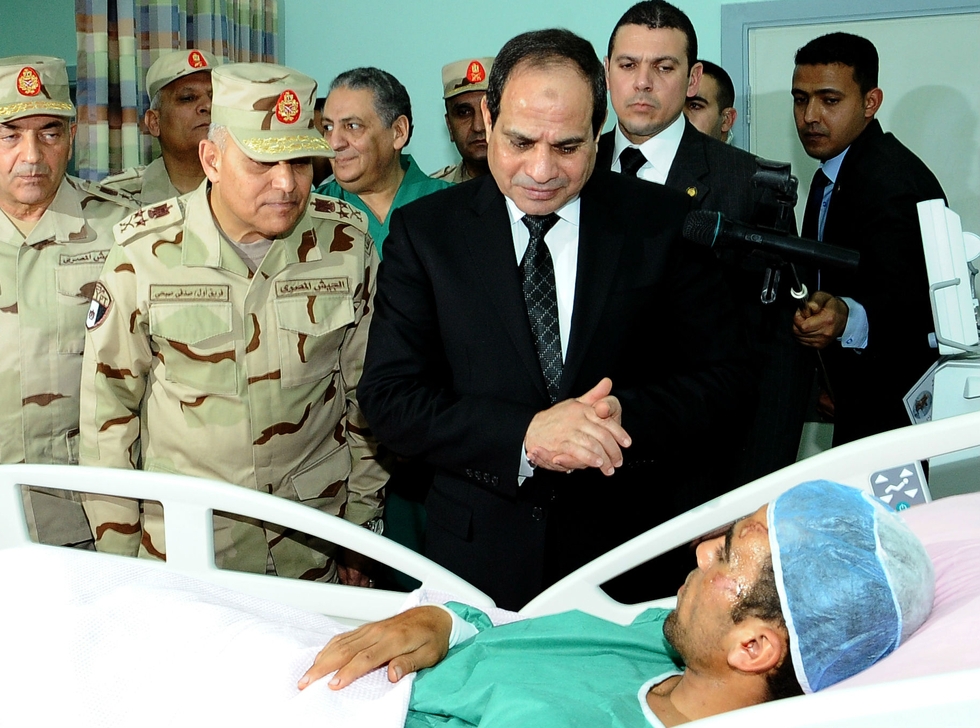Egypt's hospitals ordered to play national anthem at start of every day

Egyptian hospitals started from Wednesday morning playing the pre-recorded national anthem and doctors taking the Hippocratic Oath, following a government decision to make the ritual a daily occurrence.
Health Minister Hala Zayed issued the decision on Tuesday, saying it aims at enhancing patriotism amongst both doctors and patients, and reminding physicians of their duties and values.
“The decision will help doctors realise the huge responsibility placed on their shoulders, and will remind us of our country every day,” she told journalists.
The ritual is “part of a project aiming to improve the work environment in the health sector”, Khaled Megahed, spokesperson of the health ministry, said following the announcement.
‘Fake patriotism’
The attempt to instill patriotism in Egypt's healthare system has been roundly mocked by public figures and social media users. The Twitter hashtag "National anthem" started trending on Wednesday and a video of doctors dancing at a hospital ward went viral.
Actor and activist Khaled Abul Naga referred to Zayed in a tweet as “a minister of health with a military rank” and asked her, sarcastically, to play his favourite patriotic song in the morning hospital ritual.
“Will the national anthem be played at Zeinhom Morgue?” asked another Twitter user.
Abdallah Hussein, an Egyptian on Twitter, said the decision reflects a general trend of “fake patriotism” promoted by the government. “Fake patriotism is the slogan of every military regime,” he said.
Others highlighted the irony between the poor public health services in Egypt and today’s decision.
“The patriotism that is determined by a national anthem while humiliating citizens and failing to provide their basic needs is fake,” said Ashraf Dawaba, an Egyptian economist.
Physician Dr Khaled Samir said the decision was unnecessary and has not been implemented elsewhere in the world. In a talk show hosted by journalist Wael Ebrashy on Dream TV, Samir said hospitals need a quiet atmosphere. “The decision is propaganda, it harms patients,” he said.
Political support
MPs also appearing on Ebrashy's show expressed support for the decision. MP Ahmed Refaat, a retired army general, said it “revives patriotic sentiments”. Another MP, Mohamed Selim, said the health minister should be given a chance to implement her reform programme.
Zayed herself dismissed the sarcastic public reactions to the decision, saying: “Why are values perceived to be so bizarre?”
On Tuesday, the cabinet announced that the World Bank would offer $350m to support the health sector in Egypt.
According to the World Bank, 72 percent of all healthcare costs in Egypt in 2015 were covered by patients themselves, although more than half of the population had access to some form of health insurance.
The healthcare share of the 2018/19 government budget is 2.2 percent of GDP. This is less than the three percent minimum healthcare budget stipulated in article 18 of the Egyptian constitution.
According to the Egyptian Centre for the Right to Medicine, an independent NGO, Egypt's government has allocated 61.8bn Egyptian pounds ($3.4bn) for its health sector budget, higher than last year’s 54.9bn Egyptian pounds. However, government support for health insurance and medicine costs has declined by 500m Egyptian pounds compared to last year.
The Egyptian government has increased the prices of more than 3,000 drugs by at least 50 percent since the devaluation of the Egyptian pound in 2016, according to the NGO.
New MEE newsletter: Jerusalem Dispatch
Sign up to get the latest insights and analysis on Israel-Palestine, alongside Turkey Unpacked and other MEE newsletters
Middle East Eye delivers independent and unrivalled coverage and analysis of the Middle East, North Africa and beyond. To learn more about republishing this content and the associated fees, please fill out this form. More about MEE can be found here.

